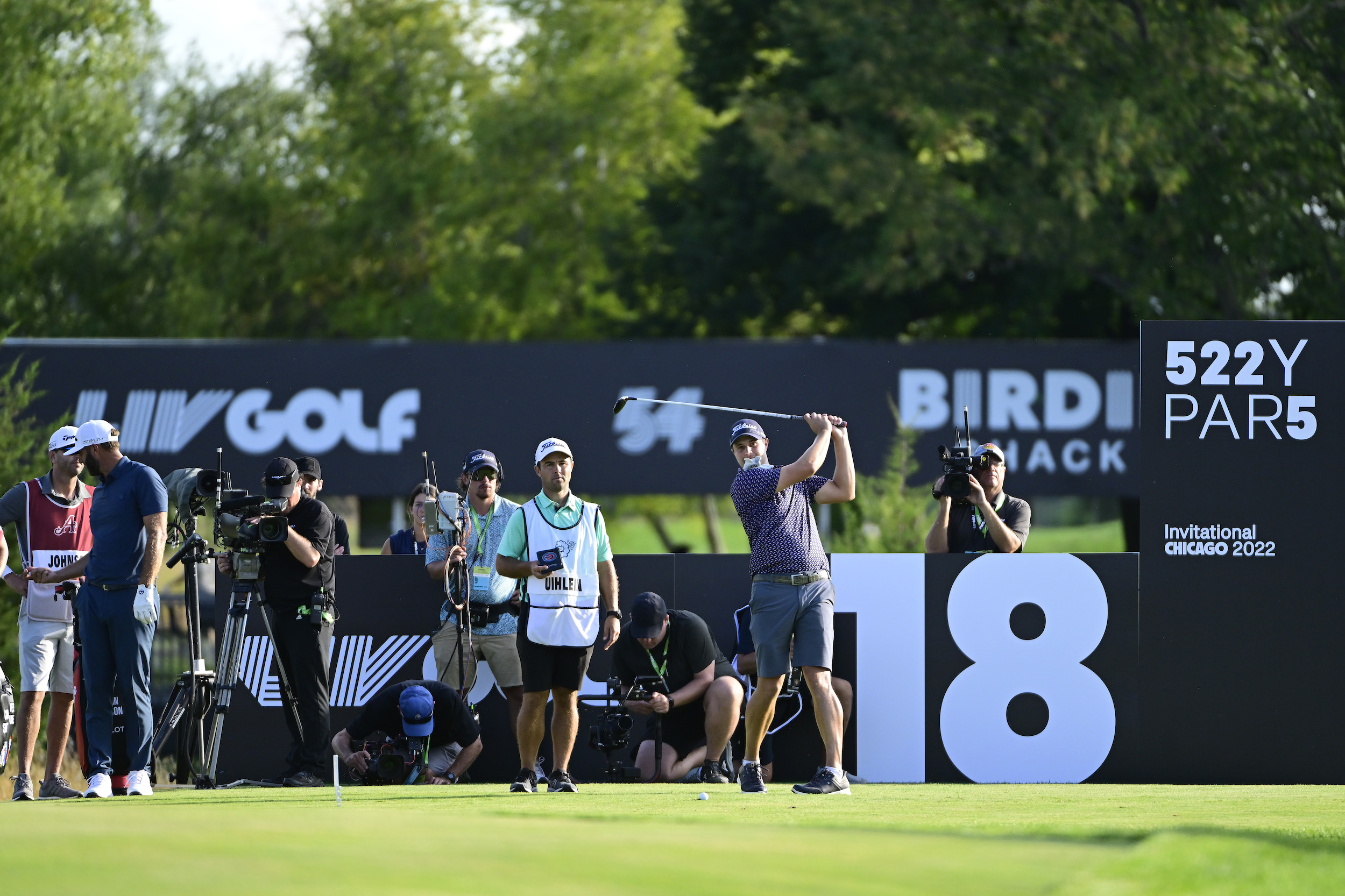LIV Golf has been hunting for a real-deal North American broadcast partner for its events since the moment of its inception. The best the Saudi-funded breakaway league has managed so far is an on-demand arrangement with over-the-top streaming service DAZN, which LIV Golf reportedly secured back in June by offering up non-exclusive broadcast rights free of charge. But free broadcast rights sort of defeat the purpose, which is to make money. This unfortunate DAZN deal was supposed to be a placeholder, until LIV Golf CEO Greg Norman could negotiate a lucrative long-term deal with, you know, a real broadcaster.
Part of Norman's job—in addition to repeating embarrassing scripted talking points about competition breeding excellence or whatever—is hyping the prospects of his new league, even as it fails to make notable inroads in a jammed North American sports calendar. Two weeks ago Norman bragged to a Chicago-area ESPN affiliate that he was engaged in negotiations with "four different networks," who'd expressed what he described as "enormous" interest in securing LIV Golf's broadcast rights. Last week, when complaining on Instagram that he'd been asked by organizers not to attend this year's Shark Shootout, a PGA Tour–affiliated team golf event he founded, Norman once again boasted that LIV Golf is "a new product that is loved by players, fans and broadcasters alike."
If you took from this a sense that a real-deal broadcast arrangement with a real-deal North American broadcaster was around the corner, you were half-right. Eamon Lynch of USA Today's Golfweek reported Tuesday night that LIV Golf is "nearing a deal" to award its broadcast rights to Fox Sports 1, an arrangement which would indeed finally bring the new tour's goofy soundtracked tournaments to cable television. But this will apparently be a long way from your usual rights arrangement: According to the report, LIV Golf would not be selling its broadcast rights to Fox, but would instead be purchasing air time to broadcast its events, after trying and failing to work out a traditional rights deal with a handful of uninterested broadcasters. In a further indignity, the unusual arrangement would reportedly require that LIV Golf do all the work of producing the broadcasts, and LIV Golf would be responsible for selling commercial sponsorships during its time slots. Brutal!
A well-placed industry executive says LIV struck out with approaches to multiple broadcasters, including NBC, CBS, Disney, Apple and Amazon, and that Fox Sports got involved only at the behest of Lachlan Murdoch, the executive chairman and CEO of Fox Corp. Last month, Sports Business Journal reported that Jared Kushner, the son-in-law of Donald Trump, had been calling broadcasters trying to generate interest in a LIV television package. In 2021, Kushner’s private equity firm, Affinity Partners, secured $2 billion in funding from the Saudi Public Investment Fund.
“There were people at Fox who wanted nothing to do with this,” the source said. “They were forced to do it.”
Golfweek
Even the minor-seeming compromises LIV Golf sought in exchange for literally paying Fox to show its events on television were reportedly rejected during negotiations. LIV Golf apparently wanted a guaranteed time slot on network television, and to secure a rights fee for year two of the deal, but both proposals were waved away by—and I just want to reiterate who we're talking about right now—executives at Fox. Lynch reports that the deal "has not yet been formally inked," so there's still time for a rejiggering of some of the details. But presumably this will not include Fox suddenly agreeing to pay for something that up to this point they have only been willing to get paid to air. If LIV Golf is going to generate revenue from television rights, it's going to have to work its ass off to do so.
Televised exposure is not the only battleground being contested in the ongoing war between LIV Golf and the PGA Tour. There's that pesky ongoing antitrust suit, filed by 11 LIV Golf players against the PGA Tour, alleging that the PGA Tour engaged in anticompetitive behavior when it suspended the memberships of defecting players and effectively banished them from PGA Tour-affiliated events. Plaintiffs have been dropping out of this lawsuit since it was filed, and in particular since a federal judge declined in early August to intercede on their behalf so that four of them could participate in this year's edition of the PGA Tour's annual season-ending tournament. Tuesday afternoon another group of players dropped out of the suit, including Talor Gooch, Ian Poulter, and the biggest name of the bunch, Phil Mickelson.
This should not be interpreted as the end of the lawsuit. Four plaintiffs remain, including Bryson DeChambeau, Matt Jones, and LIV Golf, which jumped into the fray back in August as an interested party and asked the court for "punitive damages for the PGA Tour’s bad faith and egregious interference with LIV Golf’s contractual and prospective business relationships." Now that the organizer is formally involved there is less of a need for Mickelson and others—who despite whatever claims they made in the complaint no longer have any need whatsoever for the earnings that would come from playing in a couple PGA Tour events—to spend their own time and money waging a proxy war against LIV Golf's main competitor. It speaks to the bottomlessness of LIV Golf's pockets that it can afford to stage these over-the-top events, hand over the outrageous ransoms it's paying for participants, wage a lengthy court battle, and invert traditional broadcast rights arrangements by paying to put its product on someone's television network, with nothing much to successfully monetize beyond lukewarm tallboys and middle-school-cafeteria-grade hamburgers at its surreal tournaments. It's the disruption playbook: If you can operate at a loss for long enough to weaken your competitors, you can still come out on top, even if no one really wants what it is you've got to sell.






